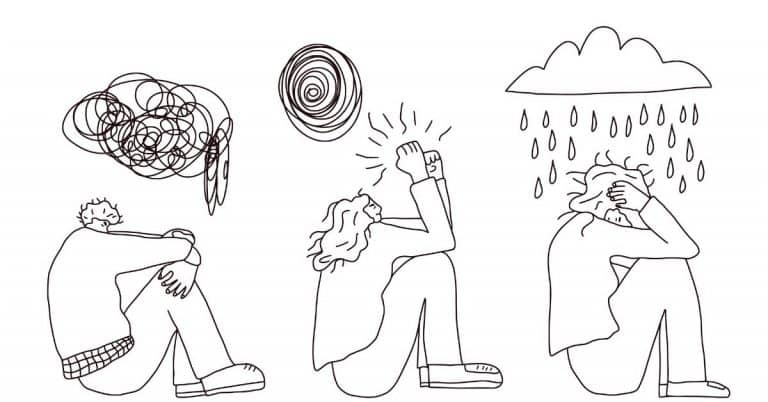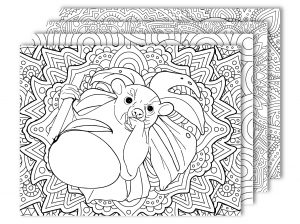

What is an anxiety disorder? How many things are you afraid of? We know a lot about anxiety, and who doesn’t these days with Covid 19, isolation from loved ones, lost jobs, financial woes, homeschooling, politics? It wouldn’t be unusual to fear just about anything right about now. If you are absolutely overwhelmed by fear and frustration today, however, you’re probably lacking the tools to manage reasonable fear. Stress relief techniques can help. Or you could actually have an anxiety disorder.
When researching this article, we were surprised to learn what might seem like a confusing fact. While anxiety is not considered a mood disorder, it can produce symptoms that define it as a mental illness. On the other hand, its close companion, depression, is defined as both a mood disorder and a mental illness. We had to take a closer look to figure out the differences.
…When feelings of intense fear and distress become overwhelming and prevent us from doing everyday activities, an anxiety disorder may be the cause. Anxiety disorders are the most common mental health concern in the United States.
NAMI
You can think about anxiety and depression this way. Depression is a powerful weight that holds you down. It can paralyze you. On the other hand, if you have an anxiety disorder; you act to create avoidance patterns. When you have a fear or phobia, you avoid it. You can’t actively avoid depression because it is a state of mind that can be caused by circumstances or a chemical in-balance in the brain. The two conditions actually are different. Here are some examples: My anxiety about flying may cause me to avoid plane travel, or I might avoid crowds during the virus. Anxiety is actually active, but it can also be crippling, just in different ways from depression.
There are several types of anxiety disorders, including generalized anxiety disorder, panic disorder, and various phobia-related disorders.
If you have generalized anxiety disorder (GAD) you worry a lot most days for at least 6 months. Here are some things you might worry about: your health, work, social interactions, and everyday routines. Your fear and anxiety can cause significant problems in areas your life like social interactions, school, and work. Information gathered from NIMH follows. This is how people with GAD feel.
Have you ever had a panic attack? People with panic disorder have recurrent unexpected panic attacks. Panic attacks are sudden periods of intense fear that come on quickly and reach their peak within minutes. Attacks can occur unexpectedly or can be brought on by a trigger, such as a feared object or situation. Symptoms include:
If you have a panic disorder, you will worry about when the next attack will happen, and your will actively try to prevent future attacks. You’ll avoid places, situations, or behaviors you associate with panic attacks. Worry about panic attacks, and the effort spent trying to avoid attacks, cause significant problems in various areas of your life, and worse, you can develop agoraphobia, and anxiety disorder that keeps you from going anywhere.
A phobia is an intense fear of—or aversion to—specific objects or situations. Although it can be realistic to be anxious in some circumstances, the fear people with phobias feel is out of proportion to the actual danger caused by the situation or object.
There are several types of phobias and phobia-related disorders including As the name suggests, people who have a specific phobia have an intense fear of, or feel intense anxiety about, certain objects or situations. Some examples of specific phobias include the fear of:
Social anxiety disorder is a general intense fear of, or anxiety toward, social or performance situations. You might worry that actions or behaviors associated with your anxiety will be negatively evaluated by others, leading you to feel embarrassed. This worry often causes people with social anxiety to avoid social situations. Social anxiety disorder can manifest in a range of situations, such as within the workplace or the school environment.
Agoraphobia is an intense fear of two or more of the following situations:
People with agoraphobia often avoid these situations, in part, because they think being able to leave might be difficult or impossible in the event they have panic-like reactions or other embarrassing symptoms. In the most severe form of agoraphobia, an individual can become housebound.
Separation anxiety disorder is often thought of as something that only children deal with; however, adults can also be diagnosed with separation anxiety disorder. People who have separation anxiety disorder have fears about being parted from people to whom they are attached. They often worry that some sort of harm or something untoward will happen to their attachment figures while they are separated. This fear leads them to avoid being separated from their attachment figures and to avoid being alone. People with separation anxiety may have nightmares about being separated from attachment figures or experience physical symptoms when separation occurs or is anticipated.
Selective mutism is a somewhat rare disorder associated with anxiety is when people fail to speak in specific social situations despite having normal language skills. Selective mutism usually occurs before the age of 5 and is often associated with extreme shyness, fear of social embarrassment, compulsive traits, withdrawal, clinging behavior, and temper tantrums. People diagnosed with selective mutism are often also diagnosed with other anxiety disorders.
Researchers are finding that both genetic and environmental factors contribute to the risk of developing an anxiety disorder. Although the risk factors for each type of anxiety disorder can vary, some general risk factors for all types of anxiety disorders include:
Anxiety disorders are generally treated with psychotherapy, medication, or both. There are many ways to treat anxiety and people should work with their doctor to choose the treatment that is best for them.
Some people with anxiety disorders benefit from joining a self-help or support group and sharing their problems and achievements with others. You should always check with your doctor before following any treatment advice found on the internet. Talking with a trusted friend or member of the clergy can also provide support, but it is not necessarily a sufficient alternative to care from a doctor or other health professional.
Stress management techniques and meditation can help people with anxiety disorders calm themselves and may enhance the effects of therapy.
Research suggests that aerobic exercise can help some people manage their anxiety. Have you tried roller skating? You can wear retro roller skates for a different kind of fun. Other exercise suggestions: go outside for a run or bike ride, take a long walk. You can also sit outside in nature for some time to soak up all that positivity. However, exercise alone can not take the place of standard care and more research is needed.
7 Best Tips For A Relapse Prevention Plan
8 Tips To Overcome Recovery Resistance










Copyright © 2023 Reach Out Recovery Services LLC | Terms and Conitions |. Site by Quadshot Digital